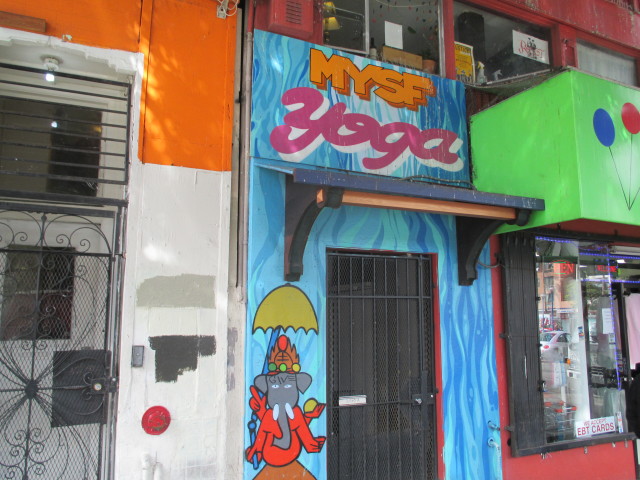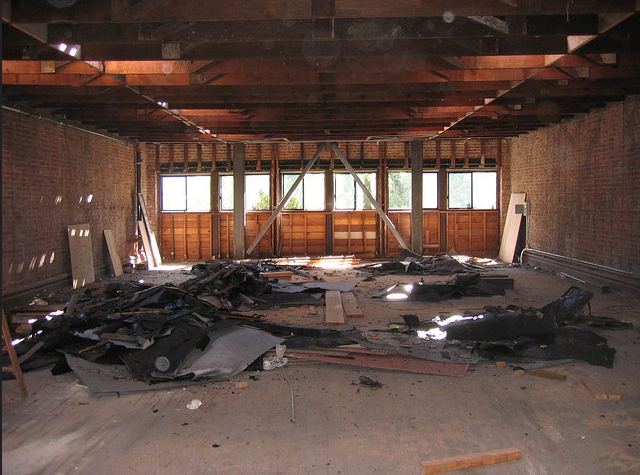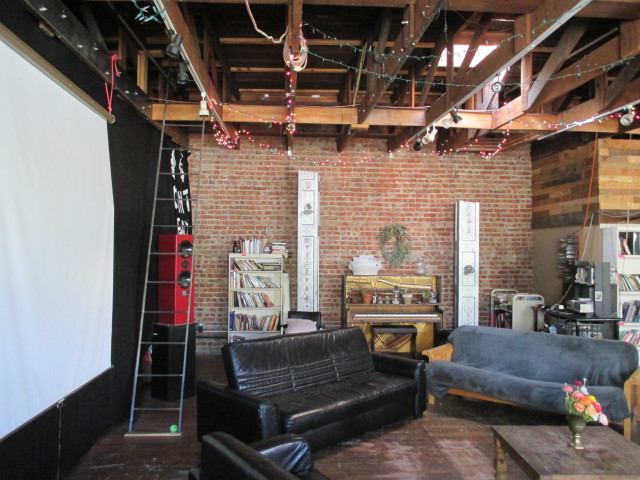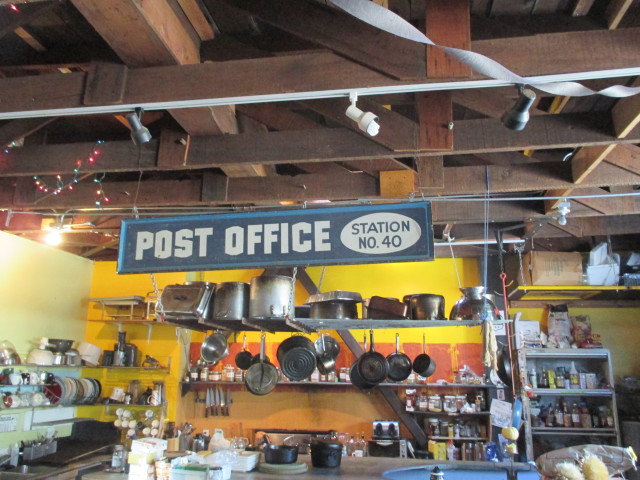Mission landlord wants to evict Station 40 — but he’s got a tech office in the same building, which is not zoned for office use

By Tim Redmond
MARCH 12, 2015 — Walk a few feet up 16th Street from Mission, and there’s a door with a sign reading “Station 40.” It has a makeshift bell: You have to pull on a rope, and an old-fashioned clanger rings manually on the second floor.
The stairs are a bit dilapidated, and the walls are covered with political posters. At the top is a large, comfortable open space with a kitchen, couches, a movie screen and a table that seats most of the 12 people who are living there. The tenants built it all — and now they’re facing eviction. The property owner says their lease doesn’t allow residential use.
Next door, there’s a gate with a more traditional electronic bell, and through the bars, you can see a clean, modern staircase with nice lighting. There is no sign on the door, no marking to show the occupants. A logo for an old Yoga studio is painted on the wall — but it’s not a studio any more. It’s a tech office.
That’s right: There’s a tech office on the second floor of a building at 16th and Mission. The company is called Assembly, and from the windows of Station 40 you can see the workers sitting outside on an interior balcony on a sunny day.
It’s about as deep an historic and political irony as you can get in the Mission in 2015: A landlord wants to evict a collective household on the grounds that people aren’t supposed to be living in the space that they have lived in for a decade – while in the same building, he has rented space to a tech company that, under city zoning rules, clearly isn’t supposed to be there.
The building at 3030 16th Street is zoned Neighborhood Commercial. You can see that on the city’s zoning map. And NC districts don’t allow general office space.
Here’s how Gina Simi, a spokesperson for the Planning Department, puts it:
All office uses permitted in NC districts are service-based (i.e. medical service, financial service, professional service, etc.). General office space, which provides no service and is not open to the public, is not permitted in any NC districts at this time, with the lone exception of Administrative Service. However, that use is only permitted by CU, and only in certain NC districts.
In other words: a yoga studio was fine. A chiropracter’s office might be okay. But not a tech office.
“All office use in Neighborhood Commercial is supposed to be neighborhood-serving,” Sue Hestor, a lawyer and one of the city’s leading experts on land use, told me. “If it’s not open to the public it’s not allowed.”
The building is owned by Jolish Limited Partnership, which records show is owned by Ahuva and Emanuel Jolish. The Jolish family, which includes son Barak and his wife Taly, own a considerable amount of property in the Mission.
The family owns not only 3030 16th but a building that is contiguous; at one point, the properties, described as rented to “commercial tenants,” was listed for sale. The description called it a “prime residential development site” with $400,000 a year in gross income. “Ground zero for the vibrant Mission District,” the listing said.
Barak and Taly Jolish are part owners of Urban Putt, an indoor mini-golf place on South Van Ness. The family owns a building on Castro Street, a couple of parcels on 24th Street, and the building on 9th Avenue that used to house Craiglist.
In other words, they aren’t small-time landlords depending on one building for survival. This is, by all outward appearances, a wealthy family.
Emanuel Jolish isn’t a big player in local politics. City records show that over the past decade, he’s given money to Gavin Newsom for Mayor, Rob Black for Supervisor, and Ross Mirkarimi for Sheriff. Mirkarimi told me he has no idea who Jolish is.
I have had an exchange of emails with Jolish, who at first agreed to meet with me to discuss the eviction and his plans for the building but then told me that after talking to his lawyer he would have nothing to say.
“It is too bad because I have so much to share with you,” he said.
When I sent a final email asking him to explain why there was a tech office in his building, he called and told me that he wouldn’t talk about that. Instead, he asked me to be “a positive person” and help look for a solution.
“I am willing to mediate,” he said. “We have been talking since last September.” I asked him why he served an eviction notice on the tenants, and he said he couldn’t discuss it. I asked him if he would consider selling the building to the SF Land Trust and he said he was open to any “solution.”
I asked if there was a solution that would allow the current tenants to stay, and he told me that he had an open mind.
I asked again: Am I wrong, or is there a tech office in a place that is zoned for residences and neighborhood services? He told me I wasn’t being positive.
Cindy Milstein, one of the members of Station 40, told me that Jolish had met with the group last year and offered a one-year lease that would specifically not allow residential use. Then his son, Barak, sent them a legal document that would have allowed an immediate eviction after one year, with no right to protest. There was no way the tenants were going to sign that.


I recently visited Station 40 and sat down with a few of the residents. The place felt like old home to me: I’ve been involved in left/radical politics for as long as I’ve been in San Francisco, and when I arrived in 1982, there were lots of places like this.
The original residents moved in more than a decade ago, and took over a badly trashed space. They cleaned it up, installed kitchen facilities, built out bedrooms, put in plumbing, and turned in, over time, into a nice, habitable place.
The members of the collective work in the Mission; several are part of the Rainbow Grocery Collective. They are multi-ethnic and gender-queer. There’s a shelf full of anarchist literature. Food Not Bombs cooks in the well-appointed and spacious kitchen.
They all chip in for rent and food. The meet once a week to talk politics and space management. Many have been there for years. It’s not just a house; it’s a family.
“You can be who you are here,” Milstein told me.
In fact, the thing they most fear from the eviction is getting split up. There’s nowhere in San Francisco that people who work in the retail and service industry and pay between $185 a month (for a loft) to $600 a month (for a private room) could possible find a new communal space like this.
“We won’t even be able to stay in the region,” Milstein told me.
No: If Station 40 is evicted, it will be gone, its members scattered to the four winds. “What, I’m going to work at Rainbow and commute from Stockton?” one member asked.
The place got its name from an old Post Office that used to be on the site. It’s not just a residence, it’s a community space; political events and meetings are held there all the time.
I suspect that the landlord was happy to get the rent in the past for a space that wasn’t worth much. But now that a major developer is planning a huge gentrifying project across the street, the land values are going up.
Like so many similar spaces in the city, Station 40 would no doubt have some work to do to bring the place up to current building codes for residences. But that’s not impossible at all: When you see what the tenants have already done, and how committed they are to the place, improvements aren’t likely to be a problem.
And the place is zoned for residential use. Which makes the idea of the tenants staying less problematic legally than the continued use of another part of the building as tech offices.

About Assembly: When the Station 40 folks told me there was a tech office next door, I was curious. I didn’t think local zoning allowed that, and when I checked, it turns out I was right.
But I wanted to be sure I wasn’t missing something, so I went to the Assembly website and looked for an address or a phone number. Tech companies are, in general, terrible about dealing with the news media, and this one is no exception: there is no phone number, no contact person, only a random “contact us” email that was never answered.
All I wanted to know is the company’s address.
But I am, of course, an investigative reporter, so I rode my bike to 16th and Mission and rang the bell. A young man wearing an “Assembly” T-shirt answered. He didn’t open the door; we talked through the gate.
I asked if that was the office of Assembly. He confirmed that it was. I asked what floor the company was on; he confirmed it was the second floor. I asked what kind of lease they had, how many workers, what the space was like. He told me he couldn’t answer those questions.
Fair enough; he apparently wasn’t a company officer or spokesperson. I left my card and asked if someone could call or email me. Nobody did.
For the record: This can’t be a “neighborhood-serving” business. Nobody in the neighborhood would have any way to know where to find it – and the staff won’t even open the gate to talk to a reporter.
There used to be space for places like Station 40 in San Francisco. They were part of the city’s radical underground anti-authoritarian culture. It’s really sad to think that they have to leave to make way for our money-driven future.
Jolish says he wants to negotiate, and there’s an excellent option on the table. The San Francisco Community Land Trust and the Mission Economic Development Agency have told Jolish they want to buy the building and use it for affordable housing. The current tenants could stay (all of them would qualify for below-market-rate dwellings); maybe Station 40 could be part of the project. And MEDA and the Land Trust could create at least 100more low-income units.
Jolish told me that he’d met with them, and “we had a positive discussion.” So let’s take a page from Emanuel Jolish and think positive.
I suspect the only way that’s going to work, though, is if he withdraws the eviction papers and agrees to let Station 40 stay, as it is, while all of this is worked out, and accepts that the end game has to involve the collective, as residential tenants, for the long term.
That’s not so hard. Shouldn’t be, anyway.





